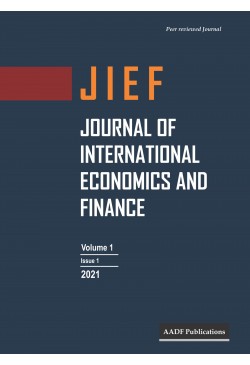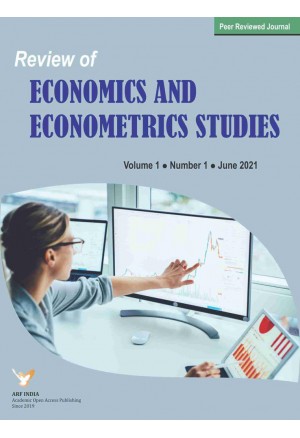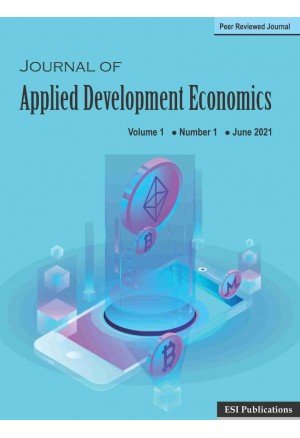JIEFJournal of International Economics and Finance

Peer Reviewed Journal
Find out more
Latest Articles :- Vol: (3) (2) (2023)
Possibility of Rationalizing the use of Water Resources in Egyptian Agriculture Rational use of Water (RUW) in Nile Delta
BY: Youssef M. Hamada
Journal of International Economics and Finance, 2023, Vol: (3), Issue: (2), PP.81-125
Received: 05 July 2023, Revised: 10 August 2023, Accepted: 18 August 2023, Publication: 30 December 2023,
The agricultural sector faces several challenges is facing the natural increase in the used water for various purposes in the future. It is adequate to show that the agriculture sector in Nile Delta used to consume about 48 billion m3 / year to irrigate about 8 million feddan even in 2010. And starting from 2017, it will bear the burden of irrigation for about 11,374 million feddan, by quantities of water amounting to about 36.750 billion m3. It imposes the need to follow policies that make sure the rationalization of irrigation water consumption. And by contrasting the current water resources with the existing water uses, it becomes clear that the current water resources are less than the existing water uses by about 16.4 billion m3. And that the development of water resources is either by exploiting the water availability resources in the best use without losing and rationalizing their exploitation and increasing the efficiency use (vertical development of water resources) or by increasing of the water available resources and increasing the economic supply for it in the future (horizontal development of water resources). And as it becomes clear of this, the proportion of what horizontal development can give is estimated at 49% whereas, vertical development can grant about 51% of the savings resulting from the development of water resources.
Due to the variation of water resources, their sources, and their uses, drawing a plan for the future use of water resources is significant which, is necessary to understand and develop many policies, including the agricultural policy, which necessarily requires a water policy. Therefore, before setting a future water policy, consideration must be taken the clear contrast between the nature of water resources and a land resource, if that is possible. So that it would be possible to direct agricultural production activities towards this goal, as they achieve one of the main aspects of the development goals and realize benefit from the advantages of specialization and comparative advantage.
Keywords: Rational use of water (RUW) in Nile delta
Youssef M. Hamada (2023). Possibility of Rationalizing the use of Water Resources in Egyptian Agriculture Rational use of Water (RUW) in Nile Delta. Journal of International Economics and Finance, 3: 2, pp. 81-125.
The Application of New Technologies in the Creation of Tourist Clusters. Case Study from Greece
BY: Evangelia D. Parisi
Journal of International Economics and Finance, 2023, Vol: (3), Issue: (2), PP.127-134
Received: 15 July 2023, Revised: 25 August 2023, Accepted: 11 September 2023, Publication: 30 December 2023,
Digital technology is gaining more and more ground in today’s world, especially in the tourism sector, with the majority of tourism businesses following the modern trends of technology, in order to enhance their competitiveness. It is important for tourism businesses to promote the tourism product, as digital technology has a high penetration in the marketing and sales of tourism businesses, while digital applications also facilitate the travel experience, as it is widely used by the potential tourist at all stages of travel preparation. Entrepreneurs now in order to cope with the competition, among related businesses in tourist destinations, have started introducing some flexible methods. One such method is clusters. A tourism cluster is a cluster of businesses and includes businesses with different elements and activities such as accommodation, travel agencies, aquariums, theme parks, public transport, etc. that are enhanced by using the tools offered by technology (Asheim, et al., 2009).
The article discusses the role of new technologies in the creation of tourism clusters by presenting a case study from Greece. The conclusions drawn are quite consistent with the theories analyzed throughout the paper.
Keywords: digital technology, clusters, tourist destination
Evangelia D Parisi (2023). The Application of New Technologies in the Creation of Tourist Clusters. Case Study from Greece. Journal of International Economics and Finance, 3: 2, pp. 127-134.
Accounting for the Role of Financial Development in the Nexus between Remittances and Economic Growth in Nigeria
BY: Eyitayo Oyewunmi Ogbaro and Oluwatomiwo Sanni
Journal of International Economics and Finance, 2023, Vol: (3), Issue: (2), PP.135-157
Received: 15 October 2023, Revised: 10 November 2023, Accepted: 19 November 2023, Publication: 30 December 2023,
Scholars believe that remittances and financial development influence economic growth by allowing funds to be made accessible to an economy’s deficit side. Hence, this study estimates the minimum threshold level of financial development that is required for remittances to promote the growth of the Nigerian economy. This is in addition to examining the direct effect of remittances as well as the interactive effect of remittances and financial development on Nigeria’s economic growth. The empirical analysis is based on the modification of the New Structural Economics theory. Annual secondary time series data for the period 1981-2021 are employed for the purpose of empirical analysis. Data on economic growth measured using GDP per capita, remittances, financial development and physical capital are sourced from World Development Indicators. Data on human capital are sourced from the Central Bank of Nigeria Statistical Bulletin. The study uses the Fully Modified Ordinary Least Square method for the econometric analysis. The results of the study show that remittances have a negative and insignificant effect on economic growth in Nigeria. In contrast, the interaction of remittances and financial development is found to exert a positive and significant effect on economic growth. Findings also reveal the threshold value of financial development beyond which remittances promote growth in Nigeria. The study concludes that the effect of remittances on economic growth is contingent upon the development of the financial sector.
Keywords: Economic growth, financial development, FMOLS, remittances
Eyitayo Oyewunmi Ogbaro & Oluwatomiwo Sanni (2023). Accounting for the Role of Financial Development in the Nexus between Remittances and Economic Growth in Nigeria. Journal of International Economics and Finance, 3: 2, pp. 135-157.
Copyright ©2023 ESI Publications. All Rights Reserved


-300x438.jpg)

